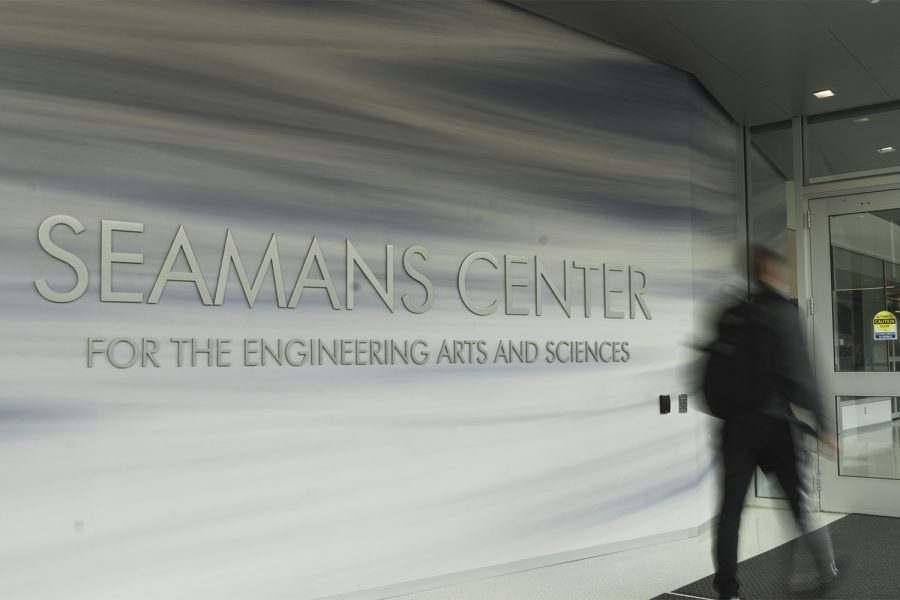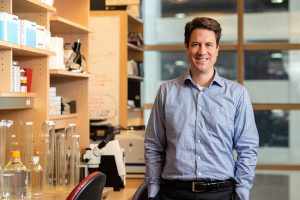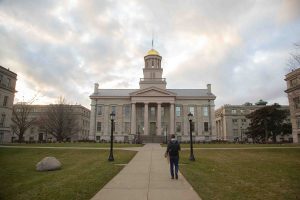University of Iowa College of Engineering receives diversity recognition, but still has work to do
Following a bronze award from the American Society for Engineering Education’s Diversity Recognition Program, the University of Iowa’s College of Engineering is ready to move forward when it comes to diversity, equity, and inclusion initiatives.
Entrance to the University of Iowa’s Seamans Center for the Engineering Arts and Sciences at 103 South Capitol Street, Iowa City, IA on Friday, Oct. 2, 2020.
February 5, 2021
After five years at the University of Iowa’s College of Engineering, graduate student Martell Bell still feels isolated.
Being one of the few Black men in the college, Bell said he often feels underrepresented. He doesn’t always see people with the same background or experiences as him in his college.
“In most of my classes, I’m the only Black male,” he said. “I was the only Black, American male in my graduating class and I feel like I’m isolated a lot of the time. There are no Black professors…It’s really tough.”
Bell is one of four graduate students on the College of Engineering’s Diversity, Equity, and Inclusion Council. Two years after the council’s establishment, there are 25 faculty, students, and staff members on it.
The American Society for Engineering Education has recognized the UI’s College of Engineering and its DEI Council as a part of its Diversity Recognition Program for the 2020-21 academic year.
The UI is one of 17 universities to receive the highest level of recognition in the program.
Infographic by Eleanor Hildebrandt/The Daily Iowan
Assistant Professor of Biomedical Engineering in the College of Engineering Kristan Worthington, who is also a member of the council, said she helped the college apply for the American Society of Engineering Education’s Diversity Recognition Program.
She said the application included a pledge from the college’s dean; a diversity, equity, and inclusion plan with strategic goals; and a narrative elaborating on the plan.
She said the council and the college overall is taking a systematic approach to executing the goals outlined in the application’s plans. This is the first year the college has received the distinction and the third year the American Society of Engineering Education gave out the recognitions.
RELATED: UI dental students, IFR call for improved diversity, equity, and inclusion in College of Dentistry
The three-part plan outlined in the application is focusing on designing and implementing equitable policies and practices that ensure students thrive, create and sustain an inclusive community that fosters a sense of belonging, and a goal of diversifying student, faculty, staff, and leadership populations in the college, Worthington said.
“We’re really being clear about not just setting goals and never thinking about them again but setting goals and creating a clear path to achieving those goals,” she said. “And [we’re] able to track whether or not we’re making progress on those goals…The application process enabled us to coalesce things together and create a unified front.”
Associate Professor of Biomedical Engineering Sarah Vigmostad, who is a co-chair of the College of Engineering’s Diversity, Equity, and Inclusion Council, said the application included a plan with levels of accountability, as well.
“For each of the goals and the specific critical tasks we outline in the application, we’ve identified accountable parties within the college,” she said. “There are people we expect to oversee or play a role in achieving these goals.”
Vigmostad said the application allowed the council to establish baseline information about how it’s doing with student retention and recruiting graduate students, as well as opportunities for growth.
Worthington said one of the most important initiatives of the plan is about creating and sustaining an inclusive environment and a collaborative community at the college.
“A big part of the plan is ensuring that individuals who are not historically dominant players in fields of engineering are given an opportunity to thrive in our college,” Worthington said. “We have a number of student organizations that are already doing fantastic work to that end and one of our goals is to increase connection points between them and the DEI Council and departments to strengthen the work that’s already happening.”
Infographic by Eleanor Hildebrandt/The Daily Iowan
One of these student organizations is the Society of Hispanic Professionals (SHPE UIOWA). President of SHPE UIOWA Gabriela Moya, who is a senior studying chemical engineering, said this recognition solidifies what the student organizations and the university have been doing in recent years.
Moya added that she’s proud of the progress that has been made by her university.
“Winning this award shows me that my college and my department cares about diversity, and that they’re not only thinking about a male dominant field,” Moya said. “It’s clear they want to broaden the engineering field. People like me, people who are underrepresented, might think that they aren’t capable of being a field that’s so rigorous, and winning this award shows that we care about making sure we know we can. We’re building a foundation.”
Bell, who serves as the graduate representative for the National Society of Black Engineers (NSBE) at the UI, said this award establishes the university’s goals and commitment to diversity and inclusion, but they are far from done.
Moving forward, Bell said he wants more quantifiable goals regarding recruitment and retention of students based on where the College of Engineering currently is.
He added that he hopes more recognition will go to individual students and organizations who are doing work behind the scenes.
“A lot of the DEI works falls on those marginalized communities having to do the work themselves,” he said. “It’s a problem that they’re solving that they didn’t create in the first place. That is work that often goes unpaid…The university does a good job of bringing people here, but they don’t do a good job of tilling the soil and keeping us here.”
With the ASEE’s recognition of the College of Engineering, Vigmostad said it reinforced the council and the community that things are progressing and going well, but that there is still more to be done.
“This is just the beginning,” she said. “We’re committed to diversity, equity, and inclusion and we plan to continue to do the work to ensure we are creating a welcoming, inclusive environment.”







